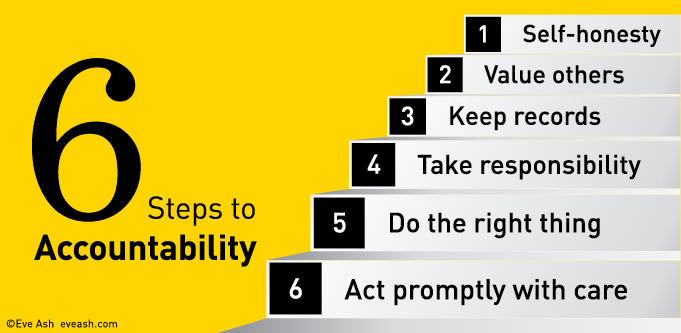Businesses should strive to get a gold star for their own “A list”: accountability. It’s a vital trait in best business practice and essential for any company wanting to be an employer of choice.
So here’s six steps to follow for anyone who has trouble grasping the salience of accountability in business.
1. Self-honesty
Accountability cannot co-exist with any form of dishonesty, whether it’s that of others or your own pig-headed unwillingness to admit things (even to yourself). Look at what’s happening around you—the effect on others, how they’re reacting, and most of all, the sum of your own actions. If you’re blocking other people verbally and emotionally, then you are refusing to take a look at yourself. Others will back away from you.
2. Value others
Australians may be increasingly living in the “gig economy”, but there’s no reason not to ensure those working for and with you aren’t looked after. Make it your business to remember that people matter just as much as profits, and cheaply-assembled service or treating staff like dispensable cogs really does come back on you eventually.
3. Keep records
Keeping good records of what you do keeps you on top of things, and being ready to account for what you do. No-one’s suggesting your every word will be scrutinised, but accountability means knowing what you’ve written, offered, signed off, and agreed to, and being able to easily access and respond to questions about your work and your actions at any time.
4. Take responsibility
Taking responsibility for what you do applies irrespective of whether you’re a manager or part of a team. You need to always ensure you do what’s required, when it’s required and to the very best of your ability. This lightens everyone’s load. Is it really that hard?
5. Do the right thing
Isn’t it good to have a clear, constructive conscience? It’s the best route to accountability and a remedy against the problems we read about every day. This does not mean becoming self-righteous (who wants that?) but rather doing the right thing, doing well by others and being constructive as you do so.
Don’t fall into the trap of “following orders”. It hasn’t worked for others in the past, and it’s no defence for behaviours and practices now.
If you’re not comfortable about what’s going on where you work, voice your concerns to the relevant people. Make sure they’re documented, backed with evidence and noted by the receiving parties. Speak up and resist manipulation by others.
And don’t assume that means whistleblowing on social media; lodge complaints using the correct processes first.
6. Act promptly with care
Acting promptly, politely and helpfully when asked certainly applies to excellent customer service, and of course everyone is our “customer” in terms of personal interaction. It’s simple—treat people the way you’d like to be treated.
Don’t allow yourself to visualise colleagues, bosses, clients and visitors with imaginary horns and pitchforks. The biggest mistake the public and private sectors are currently making is turning people into faceless numbers, or boxes to be ticked and dispatched. As we’ve recently seen with Centrelink and its robo-debt-collection system, “efficient” does not necessarily mean “accountable”.
Be human, and remember how it feels when dealing with seemingly impersonal forces that don’t care about your fate.
No matter what your job is, who you work to or the client base you may have, set the right tone and the majority of others will most assuredly follow.
Then you’ll be a proudly qualified “A lister”.
NOW READ: Do you have these 10 qualities of accountable people?
NOW WATCH: Discussing Responsibilities, Understanding Accountability

